新概念二:一般将来时_将来进行时_将来完成时练习
一般将来时-将来完成进行时混合练习

一般将来时-将来完成进行时混合练习1. 一般将来时(Future Simple)1.1 表示将来的行为、事件或情况(Predictions)一般将来时用于表示将来的行为、事件或情况。
通常与明确的时间状语连用,如"tomorrow"、"next week"、"in the future"等。
例句:- I will go to the beach tomorrow.- They will have a party next week.1.2 表示意图、决定或承诺(Intentions, Decisions, Promises)一般将来时也可用于表示意图、决定或承诺。
有时这些意图、决定或承诺是即兴的,而有时可能事先经过考虑。
例句:- I will help you with your homework.- We will visit our grandparents this weekend.- She will learn how to play the guitar.2. 将来完成进行时(Future Perfect Continuous)2.1 表示将来的持续行为(Future Continuous)将来完成进行时用于表示将来某个时间点之前开始并在该时间点之后仍在继续的持续行为。
通常与表示将来某个时间点的时间状语连用,如"by 5 o'clock"、"by tomorrow"等。
例句:- I will have been studying for 3 hours by the time you arrive.- They will have been working on the project for a whole month by next week.- She will have been living in this city for 10 years by the end of this year.2.2 表示将来的结果(Future Result)将来完成进行时还可以表示将来某个时间点之前已经开始并在该时间点之后会产生的结果。
新概念语法 将来完成时将来进行时将来完成进行时
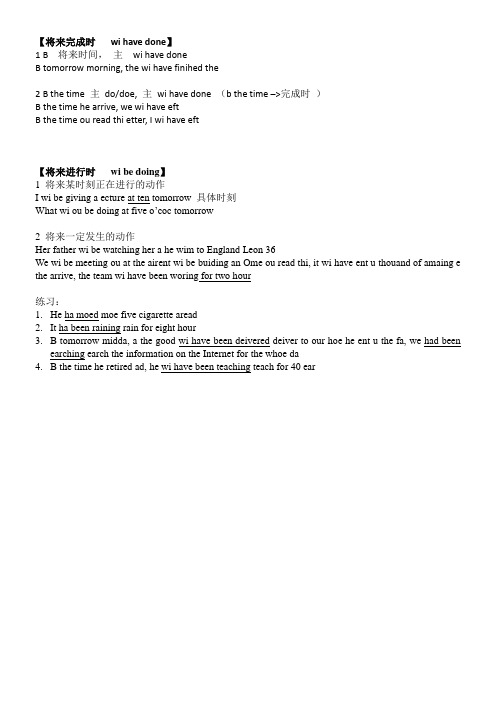
【将来完成时wi have done】1 B 将来时间,主wi have doneB tomorrow morning, the wi have finihed the2 B the time 主do/doe, 主wi have done (b the time –>完成时)B the time he arrive, we wi have eftB the time ou read thi etter, I wi have eft【将来进行时wi be doing】1 将来某时刻正在进行的动作I wi be giving a ecture at ten tomorrow 具体时刻What wi ou be doing at five o’coc tomorrow2 将来一定发生的动作Her father wi be watching her a he wim to England Leon 36We wi be meeting ou at the airent wi be buiding an Ome ou read thi, it wi have ent u thouand of amaing e the arrive, the team wi have been woring for two hour练习:1.He ha moed moe five cigarette aread2.It ha been raining rain for eight hour3. B tomorrow midda, a the good wi have been deivered deiver to our hoe he ent u the fa, we had beenearching earch the information on the Internet for the whoe da4. B the time he retired ad, he wi have been teaching teach for 40 ear。
一般将来时练习题及答案
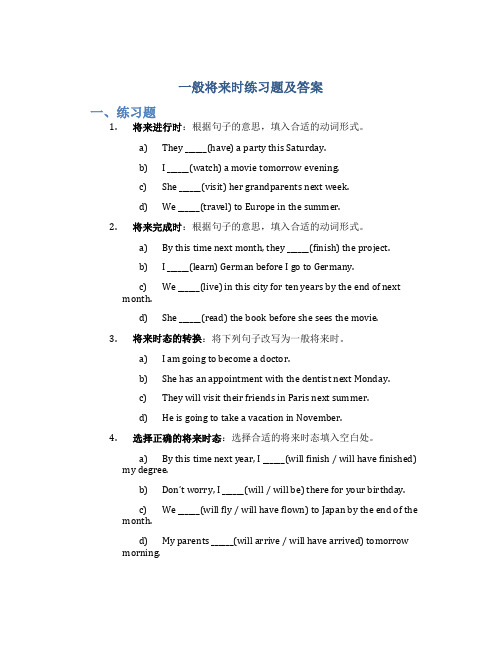
一般将来时练习题及答案一、练习题1.将来进行时:根据句子的意思,填入合适的动词形式。
a)They ______(have) a party this Saturday.b)I ______(watch) a movie tomorrow evening.c)She ______(visit) her grandparents next week.d)We ______(travel) to Europe in the summer.2.将来完成时:根据句子的意思,填入合适的动词形式。
a)By this time next month, they ______(finish) the project.b)I ______(learn) German before I go to Germany.c)We ______(live) in this city for ten years by the end of nextmonth.d)She ______(read) the book before she sees the movie.3.将来时态的转换:将下列句子改写为一般将来时。
a)I am going to become a doctor.b)She has an appointment with the dentist next Monday.c)They will visit their friends in Paris next summer.d)He is going to take a vacation in November.4.选择正确的将来时态:选择合适的将来时态填入空白处。
a)By this time next year, I ______(will finish / will have finished)my degree.b)Don’t worry, I ______(will / will be) there for your birthday.c)We ______(will fly / will have flown) to Japan by the end of themonth.d)My parents ______(will arrive / will have arrived) tomorrowmorning.二、答案1.将来进行时a)They will be having a party this Saturday.b)I will be watching a movie tomorrow evening.c)She will be visiting her grandparents next week.d)We will be traveling to Europe in the summer.2.将来完成时a)By this time next month, they will have finished the project.b)I will have learned German before I go to Germany.c)We will have lived in this city for ten years by the end of nextmonth.d)She will have read the book before she sees the movie.3.将来时态的转换a)I will become a doctor.b)She will have an appointment with the dentist next Monday.c)They will visit their friends in Paris next summer.d)He will take a vacation in November.4.选择正确的将来时态a)By this time next year, I will have finished my degree.b)Don’t worry, I will be there for your birthday.c)We will fly to Japan by the end of the month.d)My parents will arrive tomorrow morning.以上是一般将来时的练习题及答案。
新概念英语第二册语法详解和总结
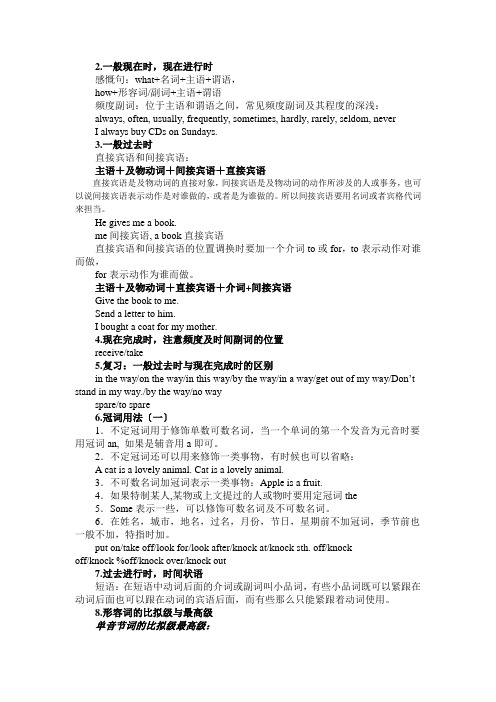
2.一般现在时,现在进行时感慨句:what+名词+主语+谓语,how+形容词/副词+主语+谓语频度副词:位于主语和谓语之间,常见频度副词及其程度的深浅:always, often, usually, frequently, sometimes, hardly, rarely, seldom, neverI always buy CDs on Sundays.3.一般过去时直接宾语和间接宾语:主语+及物动词+间接宾语+直接宾语直接宾语是及物动词的直接对象,间接宾语是及物动词的动作所涉及的人或事务,也可以说间接宾语表示动作是对谁做的,或者是为谁做的。
所以间接宾语要用名词或者宾格代词来担当。
He gives me a book.me间接宾语, a book直接宾语直接宾语和间接宾语的位置调换时要加一个介词to或for,to表示动作对谁而做,for表示动作为谁而做。
主语+及物动词+直接宾语+介词+间接宾语Give the book to me.Send a letter to him.I bought a coat for my mother.4.现在完成时,注意频度及时间副词的位置receive/take5.复习:一般过去时与现在完成时的区别in the way/on the way/in this way/by the way/in a way/get out of my way/Don’t stand in my way./by the way/no wayspare/to spare6.冠词用法〔一〕1.不定冠词用于修饰单数可数名词,当一个单词的第一个发音为元音时要用冠词an, 如果是辅音用a即可。
2.不定冠词还可以用来修饰一类事物,有时候也可以省略:A cat is a lovely animal. Cat is a lovely animal.3.不可数名词加冠词表示一类事物:Apple is a fruit.4.如果特制某人,某物或上文提过的人或物时要用定冠词the5.Some表示一些,可以修饰可数名词及不可数名词。
一般将来时、将来进行时、将来完成时
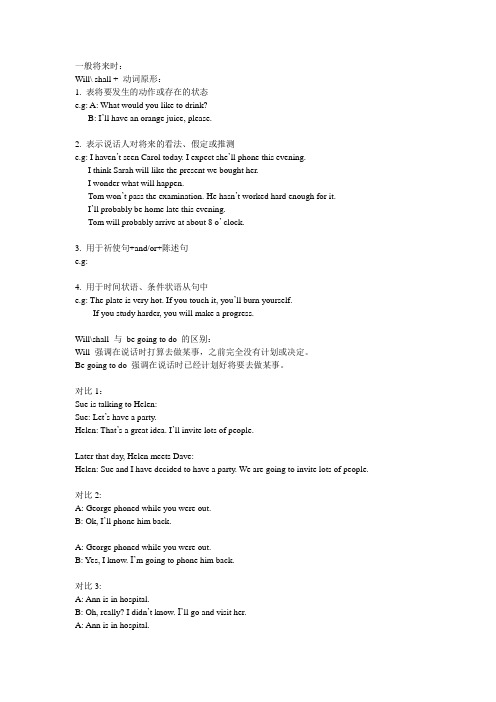
一般将来时:Will\ shall + 动词原形:1. 表将要发生的动作或存在的状态e.g: A: What would you like to drink?B: I’ll have an orange juice, please.2. 表示说话人对将来的看法、假定或推测e.g: I haven’t seen Carol today. I expect she’ll phone this evening.I think Sarah will like the present we bought her.I wonder what will happen.Tom won’t pass the examination. He hasn’t worked hard enough for it.I’ll probably be home late this evening.Tom will probably arrive at about 8 o’ clock.3. 用于祈使句+and/or+陈述句e.g:4. 用于时间状语、条件状语从句中e.g: The plate is very hot. If you touch it, you’ll burn yourself.If you study harder, you will make a progress.Will\shall 与be going to do 的区别:Will 强调在说话时打算去做某事,之前完全没有计划或决定。
Be going to do 强调在说话时已经计划好将要去做某事。
对比1:Sue is talking to Helen:Sue: Let’s have a party.Helen: That’s a great idea. I’ll invite lots of people.Later that day, Helen meets Dave:Helen: Sue and I have decided to have a party. We are going to invite lots of people.对比2:A: George phoned while you were out.B: Ok, I’ll phone him back.A: George phoned while you were out.B: Yes, I know. I’m going to phone him back.对比3:A: Ann is in hospital.B: Oh, really? I didn’t know. I’ll go and visit her.A: Ann is in hospital.B: Yes, I know. I’m going to visit her tomorrow.Will 强调个人对将来的事的预测Be going to do 强调根据客观现状推测或是确信即将要发生的事情。
一般将来时、将来进行时、将来完成时

⼀般将来时、将来进⾏时、将来完成时⼀般将来时/将来进⾏时/将来完成时⼀般将来时1.shall⽤于第⼀⼈称,常被will 所代替。
⼀是表⽰预见,⼆是表⽰意图.will 在陈述句中⽤于各⼈称,在征求意见时常⽤于第⼆⼈称。
Which paragraph shall I read first?Will you be at home at seven this evening?2.be going to +v.,表⽰将来。
1)主语的意图,即将做某事。
What are you going to do tomorrow?2)计划、安排要发⽣的事。
The play is going to be produced next month.3)有迹象要发⽣的事。
Look at the dark clouds, there is going to be a storm.3.be +to+v.表将来,按计划或正式安排将发⽣的事。
We are to discuss the report next Saturday.4.be about to +v.,意为马上做某事。
He is about to leave for Beijing.5. ⼀般现在时表将来1)下列动词:come, go, arrive, leave, start, begin, return的⼀般现在时表将来。
这主要⽤来表⽰在时间上已确定或安排好的事情。
The train leaves at six tomorrow morning.When does the bus stars? It stars in ten minutes.2)在时间或条件句中。
When Bill comes (不是will come), ask him to wait for me.I ’ll write to you as soon as I arrive there.6. ⽤现在进⾏时表⽰将来主要意义是表⽰按计划、安排即将发⽣的动作,常⽤于位置转移的动词。
将来完成时与将来进行时练习题及答案
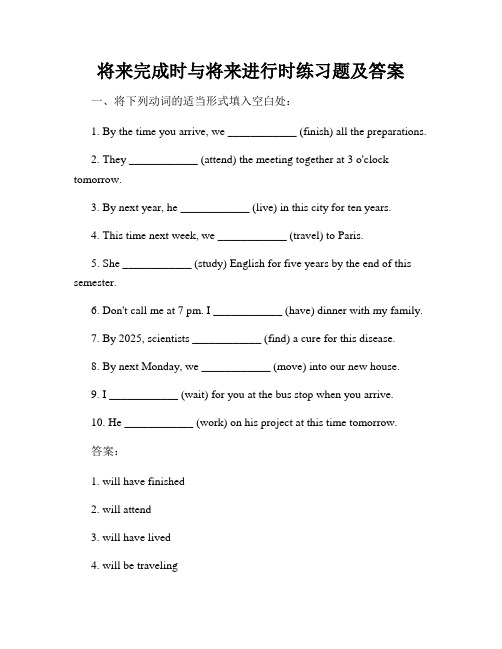
将来完成时与将来进行时练习题及答案一、将下列动词的适当形式填入空白处:1. By the time you arrive, we ____________ (finish) all the preparations.2. They ____________ (attend) the meeting together at 3 o'clock tomorrow.3. By next year, he ____________ (live) in this city for ten years.4. This time next week, we ____________ (travel) to Paris.5. She ____________ (study) English for five years by the end of this semester.6. Don't call me at 7 pm. I ____________ (have) dinner with my family.7. By 2025, scientists ____________ (find) a cure for this disease.8. By next Monday, we ____________ (move) into our new house.9. I ____________ (wait) for you at the bus stop when you arrive.10. He ____________ (work) on his project at this time tomorrow.答案:1. will have finished2. will attend3. will have lived4. will be traveling5. will have studied6. will be having7. will have found8. will have moved9. will be waiting10. will be working二、使用括号中所给动词的适当进行时或完成时填空:1. She _______________ (clean) her room when I visited her yesterday.2. They _______________ (play) basketball at the sports center tomorrow morning.3. By this time next week, I ____________________ (finish) my exams.4. We ___________________ (wait) for the bus when it starts to rain.5. _______________ (You/give) her the book by the time I see you tomorrow?6. He __________________ (practice) the piano for two hours by the time his parents come home.7. I ____________________ (not/see) them again before I move to another country.8. By the end of next month, they __________________ (visit) ten different countries.9. She ____________________ (not/eat) lunch yet, so we can go out fora meal together.10. By this time next year, I __________________ (graduate) from university.答案:1. was cleaning2. will be playing3. will have finished4. will be waiting5. Will you have given6. will have practiced7. will not have seen8. will have visited9. has not eaten10. will have graduated三、将下列句子改写为使用将来进行时:1. We are going to have dinner at 7 pm tomorrow.→ We will be having dinner at 7 pm tomorrow.2. They are watching a movie at the cinema tonight.→ They will be watching a movie at the cinema tonight.3. She is attending a conference next month.→ She will be attending a conference next month.4. I am working on a project at the moment.→ I will be working on a project at the moment.5. We are studying for our exams this week.→ We will be studying for our exams this week.答案:1. We will be having dinner at 7 pm tomorrow.2. They will be watching a movie at the cinema tonight.3. She will be attending a conference next month.4. I will be working on a project at the moment.5. We will be studying for our exams this week.四、将下列句子改写为使用将来完成时:1. She will have finished her homework by 10 pm tonight.2. They will have completed the project by the end of the month.3. By this time next year, he will have saved enough money to buy a car.4. I will have read the book by the time we meet next week.5. We will have finished the presentation before the deadline.答案:1. By 10 pm tonight, she will have finished her homework.2. By the end of the month, they will have completed the project.3. By this time next year, he will have saved enough money to buy a car.4. By the time we meet next week, I will have read the book.5. Before the deadline, we will have finished the presentation.。
一般将来时与将来进行时与将来完成时练习题及答案
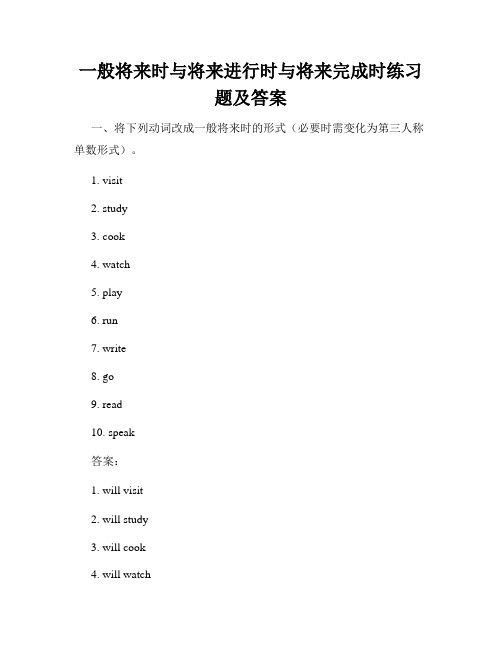
一般将来时与将来进行时与将来完成时练习题及答案一、将下列动词改成一般将来时的形式(必要时需变化为第三人称单数形式)。
1. visit2. study3. cook4. watch5. play6. run7. write8. go9. read10. speak答案:1. will visit2. will study3. will cook4. will watch5. will play6. will run7. will write8. will go9. will read10. will speak二、将下列句子改成将来进行时的形式。
1. I am reading a book.2. She is studying Chinese.3. They are playing football.4. He is eating dinner.5 It is raining outside.答案:1. I will be reading a book.2. She will be studying Chinese.3. They will be playing football.4. He will be eating dinner.5. It will be raining outside.三、将下列句子改成将来完成时的形式。
1. I have finished my homework.2. She has written a letter.3. They have gone to the supermarket.4. He has met his friend.5. We have cooked dinner.答案:1. I will have finished my homework.2. She will have written a letter.3. They will have gone to the supermarket.4. He will have met his friend.5. We will have cooked dinner.四、将下列句子改成将来完成进行时的形式。
(完整版)一般将来时与将来进行时练习题及答案

一般将来时练习题( ) 1. There __________ a meeting tomorrow afternoon.A. will be going toB. will going to beC. is going to beD. will go to be( ) 2. Charlie ________ here next month.A. isn’t workingB. doesn’t workingC. isn’t going to workingD. won’t work( ) 3. He ________ very busy this week, he ________ free next week.A. will be; isB. is; isC. will be; will beD. is; will be( ) 4. There ________ a dolphin show in the zoo tomorrow evening.A. wasB. is going to haveC. will haveD. is going to be( ) 5. –________ you ________ free tomorrow?– No. I ________ free the day after tomorrow.A. Are; going to; willB. Are; going to be; willC. Are; going to; will beD. Are; going to be; will be ( ) 6. Mother ________ me a nice present on my next birthday.A. will givesB. will giveC. givesD. give( ) 7. – Shall I buy a cup of tea for you?–________. (不,不要。
英语时态将来时

2. 两者均可表示将来,但用将来进行时语气更 委婉,比较:
When will you finish these letters? (直接询问) When will you be seeing Mr. White? (委婉地询 问) When will you pay back the money? (直接) When will you be paying back the money (委婉) 3. 有时一般将来中的will含有“愿意”的意思, 而用将来进行时则只是单纯地谈未来情况。如:
---I __C___my favourite program at 8 o’clock
tomorrow evening.
A. will watch
B. am going to watch
C. will be watching D. am watching
Complete the sentences with the given words.
6. ---Can you attend the party tonight?
---No, I __C___ the boss about something
urgent.
A. see
B. shall have seen
C. will be seeing D. can see
7. ---What will you do tomorrow evening?
在after, when, as soon as, until, before引导的时间 状语从句、if 条件状语中,不用助动词will, 只用 一般现在时表示将来。
When you get home on Friday, you’ll receive good news. 如果 在强调一个动作在另一个动作之前时,用现 在完成时表示将来某时完成的动作。
将来时的各种形式及例句整理

将来时的各种形式及例句整理将来时是英语中用来表示将来动作或状态的一种时态,包含了多种形式。
在本文中,将介绍将来时的各种形式并提供相应的例句。
一、一般将来时一般将来时表示将来某个时间会发生的动作或状态。
一般将来时的构成方式如下:1. 主语 + will + 动词原形2. 主语 + be going to + 动词原形以下是一些例句:1. I will go to the movies tomorrow.(我明天会去看电影。
)2. They are going to have a party next week.(他们下周要开派对。
)3. She will learn to play the piano.(她将学会弹钢琴。
)二、将来进行时将来进行时表示将来某一时刻正在进行的动作。
将来进行时的构成方式如下:1. 主语 + will be + 动词ing以下是一些例句:1. They will be watching a movie at this time tomorrow.(明天此时他们将在看电影。
)2. She will be working on her project tomorrow morning.(明天早上她将在进行项目工作。
)三、将来完成时将来完成时表示将来某一时刻之前已经完成的动作。
将来完成时的构成方式如下:1. 主语 + will have + 过去分词以下是一些例句:1. By the time he arrives, I will have finished my homework.(等他到达时,我将已经完成作业。
)2. They will have left for Paris by the end of this month.(到本月末,他们将已经去巴黎了。
)四、将来完成进行时将来完成进行时表示将来某一时刻之前已经开始并且一直在进行的动作。
将来完成进行时的构成方式如下:1. 主语 + will have been + 动词ing以下是一些例句:1. By the time they arrive, we will have been waiting for three hours.(等他们到达时,我们将已经等待了三个小时。
(完整版)新概念第二册各课的语法点归纳
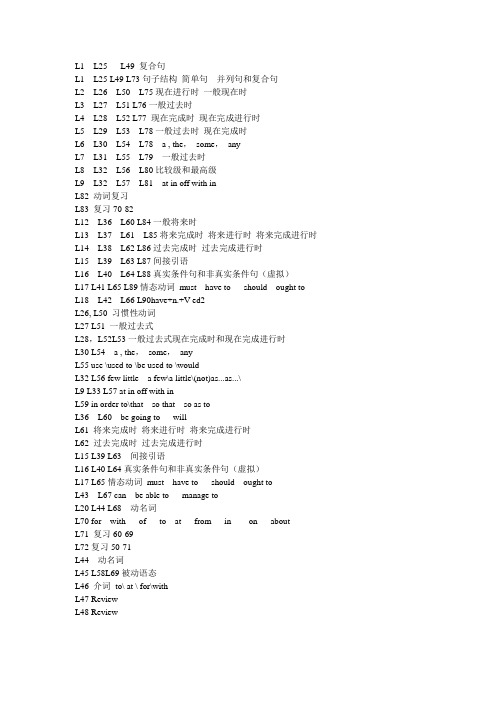
L1 L25 L49 复合句L1 L25 L49 L73句子结构简单句并列句和复合句L2 L26 L50 L75现在进行时一般现在时L3 L27 L51 L76一般过去时L4 L28 L52 L77 现在完成时现在完成进行时L5 L29 L53 L78一般过去时现在完成时L6 L30 L54 L78 a , the,some,anyL7 L31 L55 L79 一般过去时L8 L32 L56 L80比较级和最高级L9 L32 L57 L81 at in off with inL82 动词复习L83 复习70-82L12 L36 L60 L84一般将来时L13 L37 L61 L85将来完成时将来进行时将来完成进行时L14 L38 L62 L86过去完成时过去完成进行时L15 L39 L63 L87间接引语L16 L40 L64 L88真实条件句和非真实条件句(虚拟)L17 L41 L65 L89情态动词must have to should ought toL18 L42 L66 L90have+n.+V-ed2L26, L50 习惯性动词L27 L51 一般过去式L28,L52L53一般过去式现在完成时和现在完成进行时L30 L54 a , the,some,anyL55 use \used to \be used to \wouldL32 L56 few little a few\a little\(not)as...as...\L9 L33 L57 at in off with inL59 in order to\that so that so as toL36 L60 be going to willL61 将来完成时将来进行时将来完成进行时L62 过去完成时过去完成进行时L15 L39 L63 间接引语L16 L40 L64真实条件句和非真实条件句(虚拟)L17 L65情态动词must have to should ought toL43 L67 can be able to manage toL20 L44 L68 动名词L70 for with of to at from in on aboutL71 复习60-69L72复习50-71L44 动名词L45 L58L69被动语态L46 介词to\ at \ for\withL47 ReviewL48 Review。
六年级时态将来时练习题

六年级时态将来时练习题将来时态是指表示将来发生的动作或状态的一种时态。
在英语中,将来时态有多种表达方式,主要包括将来一般时、将来进行时和将来完成时。
本文将为你提供一些六年级学生练习将来时态的题目,帮助你巩固对将来时的掌握。
练习一:将来一般时根据句子的提示,用适当的动词形式填空。
1. I ________ (go) to the park tomorrow with my friends.2. They ________ (have) a picnic next Saturday if the weather is good.3. She ________ (visit) her grandparents during the summer vacation.4. We ________ (watch) a movie tonight at the cinema.5. He ________ (play) football with his classmates after school.练习二:将来进行时根据句子的提示,用适当的动词形式填空。
1. This time tomorrow, I ________ (study) for my English exam.2. They ________ (travel) to Beijing next month.3. She ________ (swim) in the river at this time next year.4. We ________ (have) a party at this time next week.5. He ________ (play) the piano when I visit him tomorrow.练习三:将来完成时根据句子的提示,用适当的动词形式填空。
1. By the end of this month, I ________ (read) three books.2. They ________ (finish) their homework before dinner.3. She ________ (clean) her room by the time her friends arrive.4. We ________ (visit) the museum after we have lunch.5. He ________ (live) in this city for ten years by the end of next month.练习四:综合练习根据句子的提示,用适当的动词形式填空。
新概念英语第二册
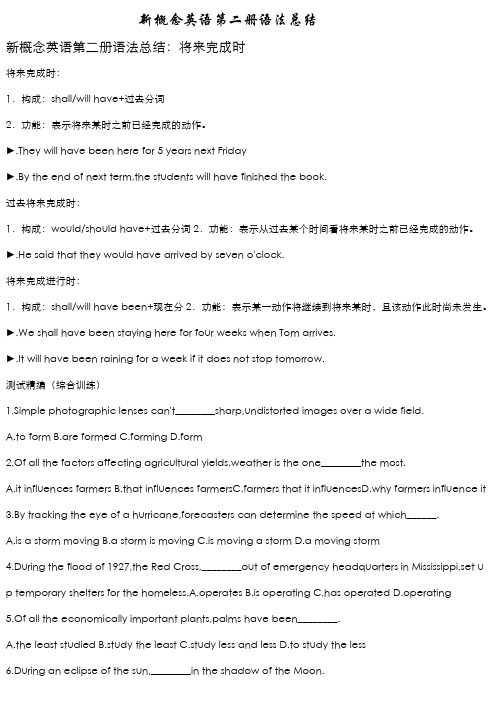
新概念英语第二册语法总结新概念英语第二册语法总结:将来完成时将来完成时:1.构成:shall/will have+过去分词2.功能:表示将来某时之前已经完成的动作。
►.They will have been here for 5 years next Friday►.By the end of next term,the students will have finished the book.过去将来完成时:1.构成:would/should have+过去分词2.功能:表示从过去某个时间看将来某时之前已经完成的动作。
►.He said that they would have arrived by seven o'clock.将来完成进行时:1.构成:shall/will have been+现在分2.功能:表示某一动作将继续到将来某时,且该动作此时尚未发生。
►.We shall have been staying here for four weeks when Tom arrives.►.It will have been raining for a week if it does not stop tomorrow.测试精编(综合训练)1.Simple photographic lenses can't________sharp,undistorted images over a wide field.A.to formB.are formedC.formingD.form2.Of all the factors affecting agricultural yields,weather is the one________the most.A.it influences farmersB.that influences farmersC.farmers that it influencesD.why farmers influence it3.By tracking the eye of a hurricane,forecasters can determine the speed at which______.A.is a storm movingB.a storm is movingC.is moving a stormD.a moving storm4.During the flood of 1927,the Red Cross,________out of emergency headquarters in Mississippi,set u p temporary shelters for the homeless.A.operates B.is operating C.has operated D.operating5.Of all the economically important plants,palms have been________.A.the least studiedB.study the leastC.study less and lessD.to study the less6.During an eclipse of the sun,________in the shadow of the Moon.A.the Earth liesB.the Earth when lyingC.that the Earth liesD.the lying Earth7.The photo periodic response of algae actually depends on the duration of darkness,___.A.the light is not onB.and not on lightC.but is not on the lightD.is not on light8.The wallflower_____because its weak stems often grow on walls and along strong cliffs for support.A.so called isB.so is calledC.is so calledD.called is so9.Because of its importance in modern living,________in all parts of the world.A.algebra is studied in schools and collegesB.studying algebra in schools and collegesC.and the study of algebra in schools and collegesD.in schools and colleges are algebra studies10.Sociologists have long recognized that social tension________.A.elements from group livingB.elements of a normal group lifeC.living are a group of elementsD.a re normal elements of group lifeKEYS1.D 2.B 3.B 4.D 5.A 6.A 7.B 8.C 9.A 10.D新概念英语第二册语法总结:现在完成时现在完成时:1.构成:have/has+过去分词2.功能:(1)表示过去所发生的动作对现在的影响或产生的结果。
新概念英语第二册语法解析及练习题:一般将来时
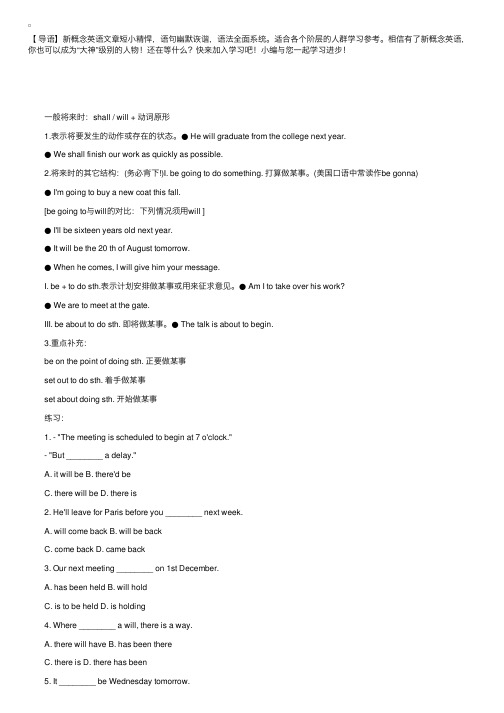
【导语】新概念英语⽂章短⼩精悍,语句幽默诙谐,语法全⾯系统。
适合各个阶层的⼈群学习参考。
相信有了新概念英语,你也可以成为“⼤神”级别的⼈物!还在等什么?快来加⼊学习吧!⼩编与您⼀起学习进步! ⼀般将来时:shall / will + 动词原形 1.表⽰将要发⽣的动作或存在的状态。
● He will graduate from the college next year. ● We shall finish our work as quickly as possible. 2.将来时的其它结构:(务必背下!)I. be going to do something. 打算做某事。
(美国⼝语中常读作be gonna) ● I'm going to buy a new coat this fall. [be going to与will的对⽐:下列情况须⽤will ] ● I'll be sixteen years old next year. ● It will be the 20 th of August tomorrow. ● When he comes, I will give him your message. I. be + to do sth.表⽰计划安排做某事或⽤来征求意见。
● Am I to take over his work? ● We are to meet at the gate. III. be about to do sth. 即将做某事。
● The talk is about to begin. 3.重点补充: be on the point of doing sth. 正要做某事 set out to do sth. 着⼿做某事 set about doing sth. 开始做某事 练习: 1. - "The meeting is scheduled to begin at 7 o'clock." - "But ________ a delay."A. it will beB. there'd beC. there will beD. there is 2. He'll leave for Paris before you ________ next week.A. will come backB. will be backC. come backD. came back 3. Our next meeting ________ on 1st December.A. has been heldB. will holdC. is to be heldD. is holding 4. Where ________ a will, there is a way.A. there will haveB. has been thereC. there isD. there has been 5. It ________ be Wednesday tomorrow.A. is going toB. willC. is about toD. is to 答案:1. C2. C3. C4. C5. B。
- 1、下载文档前请自行甄别文档内容的完整性,平台不提供额外的编辑、内容补充、找答案等附加服务。
- 2、"仅部分预览"的文档,不可在线预览部分如存在完整性等问题,可反馈申请退款(可完整预览的文档不适用该条件!)。
- 3、如文档侵犯您的权益,请联系客服反馈,我们会尽快为您处理(人工客服工作时间:9:00-18:30)。
练习:
一.单选题
1. There __________ a meeting tomorrow afternoon.
A. will be going to
B. will going to be
C. is going to be
D. will go to be
2. Charlie ________ here next month.
A. isn’t working
B. doesn’t working
C. isn’t going to working
D. won’t work
3. He ________ very busy this week, he ________ free next week.
A. will be; is
B. is; is /
C. will be; will be
D. is; will be
4. There ________ a dolphin show in the zoo tomorrow evening.
A. was
B. is going to have
C. will have
D. is going to be
5. If it ________ tomorrow, we roller-skating.
A. isn’t rain ,will go
B. won’t rain , will go
C. doesn’t rain,will go
D. doesn’t fine ,go
6.I won’t be able to attend the meeting tonight because____ then.
A. I must have a class
B. I will be teaching a class
C. I teach a class
D. I will have taught a class
7. -----Could you give these books to Mr. Black?-----Absolutely, ___ him at five this afternoon.
A. I will have a talk with
B. I have a talk with
C. I can have a talk with
D. I will be having a talk with
8. I’m afraid I won’t be available then. I ___ a friend at three this afternoon.
A. see
B. am seeing
C. will see
D. will be seeing
9. Next Friday I to another concert. They ____ some thing by Mozart at that time.
A.go, play
B.will go , will be playing
C. will go , are going to play
D. are going ,are to play
10. -----What are you doing, Jack?
-----Make a model plane. I ____ it in the science class at 10 o’clock tomorrow morning.
A. will be showing
B. am going to show
C. show
D. have showed
11. By the end of this year ,I ____enough money for a holiday.
A will save
B will be saving
C will have saved
D have saved
12. I have been studying here for four years,by next summer ____-.
A shall graduate
B shall be graduated
C shall be graduating
D shall have graduated
13. I hope her health _______greatly by the time we come back next year.
A improves
B improved
C will be improved
D will have improve
14. “Are you going to Richard”s birthday party?…“Yes.By then I ______my homework..”
A had finished
B will have finished
C would have finished
D finished
15. I suppose by the time I come back in ten years‟ time all these old house______down.
A will have been pulled
B will be pulling
C will have pulled
D will be pulled
二、翻译题
1.当我明天早晨起床是,我妈妈将在为我准备早饭。
2.你来的时候我们将在开会。
3.他下个生日前会拿到飞行证的。
4.下星期这时候我们将在那个工厂劳动。
1.We shall be working in that factory this time next week.
2.When I get up tomorrow, my mother will be getting breakfast for me.
3.When you come we shall be having a meeting.
4.He will have gained his pilot’s license before his next birthday. CDDCAA。
